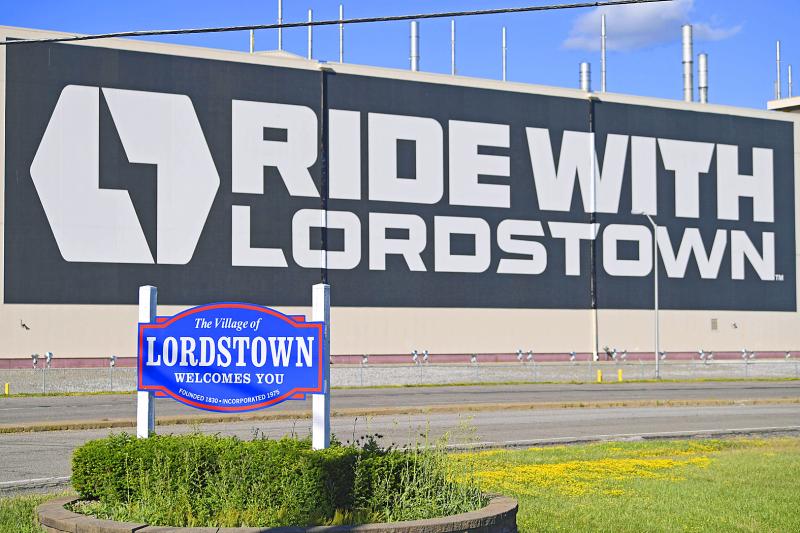Foxconn Technology Group’s (富士康科技集團) planned purchase of embattled start-up Lordstown Motors Corp’s auto plant in Ohio might make it a stronger contender to assemble electric vehicles for Apple Inc, but success with the endeavor is far from guaranteed.
The Taiwanese company is the largest maker of iPhones, giving it a potential edge as Apple explores the automotive sector.
Foxconn agreed to spend US$280 million on the Lordstown deal, one of the top vehicle-related investments it has made over the past two years.

Photo: AP
Foxconn’s early moves into electric vehicles have yielded few tangible results and Apple is expected to require solid proof of vehicle-manufacturing expertise before it settles on a partner — if the iPhone maker decides to make the leap into autos at all.
Shares of Hon Hai Precision Industry Co (鴻海精密), as Foxconn is known in Taiwan, fell in Taipei trading yesterday in a sign of investor doubt the plant purchase would be a game changer for the electronics giant.
“It is only logical for Foxconn to explore vehicle manufacturing to stay relevant,” said Steve Man, an automotive analyst at Bloomberg Intelligence in Hong Kong. “If you look at the upstream companies in its value chain, many are dabbling in electric, smart vehicles. Cars are becoming the next mobile devices.”
While Foxconn has inked several electric-vehicle partnerships, its investment in the business has been relatively modest and far behind that by auto giants such as Volkswagen AG or Hyundai Motor Co.
Scoring a deal with Apple would vault Foxconn into a major player in the rapidly growing segment, which it is targeting as a source of growth beyond low-margin electronics.
Apple, which is not expected to enter the market for several years, but is kooking into it, would be the ultimate prize for every aspiring electric vehicle manufacturer.
Working in Foxconn’s favor is its strong relationship with the US firm. The years-long partnership has expanded as Apple has added product categories and the company now accounts for about 50 percent of Foxconn’s annual sales.
Any Apple automobile is still years away and the company has suffered setbacks, including the departure of the head of its electric vehicle project to Ford Motor Co.
An Apple electric vehicle has for years been somewhat of a paradox — it is one of its most hotly anticipated products, yet the company has publicly said almost nothing about it.
Analysts at CL Securities Taiwan said in a note that the plant purchase is cheaper and quicker than building capacity from scratch, which “should help alleviate some investors’ concerns on the visibility for EV [electric vehicle] earnings contribution.”
Foxconn has yet to commercially release any vehicle following the debut of its electric vehicle platform last year.
It plans to start mass production of Lordstown’s Endurance electric pickup truck in Ohio in April next year, a person familiar with its schedule said.
The Lordstown deal “reflects Foxconn’s flexibility in providing design and production services for different EV customers,” Hon Hai chairman Young Liu (劉揚偉) said in a statement yesterday.

Among the rows of vibrators, rubber torsos and leather harnesses at a Chinese sex toys exhibition in Shanghai this weekend, the beginnings of an artificial intelligence (AI)-driven shift in the industry quietly pulsed. China manufactures about 70 percent of the world’s sex toys, most of it the “hardware” on display at the fair — whether that be technicolor tentacled dildos or hyper-realistic personalized silicone dolls. Yet smart toys have been rising in popularity for some time. Many major European and US brands already offer tech-enhanced products that can enable long-distance love, monitor well-being and even bring people one step closer to

Malaysia’s leader yesterday announced plans to build a massive semiconductor design park, aiming to boost the Southeast Asian nation’s role in the global chip industry. A prominent player in the semiconductor industry for decades, Malaysia accounts for an estimated 13 percent of global back-end manufacturing, according to German tech giant Bosch. Now it wants to go beyond production and emerge as a chip design powerhouse too, Malaysian Prime Minister Anwar Ibrahim said. “I am pleased to announce the largest IC (integrated circuit) Design Park in Southeast Asia, that will house world-class anchor tenants and collaborate with global companies such as Arm [Holdings PLC],”

Sales in the retail, and food and beverage sectors last month continued to rise, increasing 0.7 percent and 13.6 percent respectively from a year earlier, setting record highs for the month of March, the Ministry of Economic Affairs said yesterday. Sales in the wholesale sector also grew last month by 4.6 annually, mainly due to the business opportunities for emerging applications related to artificial intelligence (AI) and high-performance computing technologies, the ministry said in a report. The ministry forecast that retail, and food and beverage sales this month would retain their growth momentum as the former would benefit from Tomb Sweeping Day

TRANSFORMATION: Taiwan is now home to the largest Google hardware research and development center outside of the US, thanks to the nation’s economic policies President Tsai Ing-wen (蔡英文) yesterday attended an event marking the opening of Google’s second hardware research and development (R&D) office in Taiwan, which was held at New Taipei City’s Banciao District (板橋). This signals Taiwan’s transformation into the world’s largest Google hardware research and development center outside of the US, validating the nation’s economic policy in the past eight years, she said. The “five plus two” innovative industries policy, “six core strategic industries” initiative and infrastructure projects have grown the national industry and established resilient supply chains that withstood the COVID-19 pandemic, Tsai said. Taiwan has improved investment conditions of the domestic economy